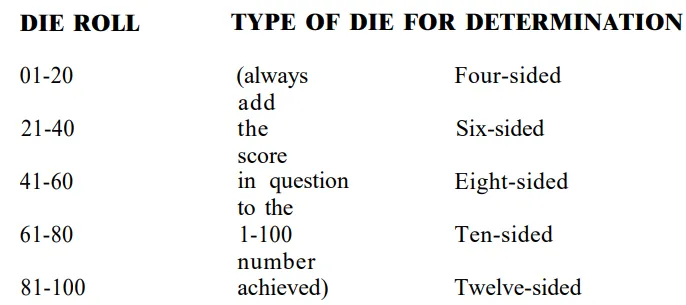A Review "HOW TO USE NON-PRIME-REQUISITE CHARACTER ATTRIBUTES"
Written by Wesley D Ives in the June 1976 copy of Dragon Magazine this article lays out an early attempt at making a skill system for D&D a year before AD&D laid out their more concise skill system. This system didn't have specific skills but rather used a series of 3 rolls as detailed below.

In this detail you roll d100 to determine a die to use. You then roll the associated die and multiply that by your base score. Then the amount you get there is the percent chance of success.
There are modifiers on this such as if you are a class that doesn't have a good chance of success on a task (ex. a Fighter picking a lock) you just use your relevant attribute as your percent chance to succeed and you add to hit modifiers from level to your relevant check.
This is all good if a little clunky of a system in practice at the table but the interesting bit to me are some of the rulings the author made as to when to use different attributes.
Every character can attempt every skill and all of them may attempt it once.
This is interesting because many modern GMs and advices say just do one check for the best skill person in the party. I believe that in old school dungeons when time is danger due to the high risk of random encounters it is ok to let players keep taking dungeon turns to have 9% chances to succeed at picking the lock because at any point 6 giant centipedes may come and devour the party wizard.
Wisdom is used to determine item purposes. Intelligence to determine function.
Identification of magic items and other items that may be found is done with wisdom. So say you find a strange wooden rod with metal caps on either end. A wisdom check may tell you this is an immovable rod but an intelligence check will tell you that you know Immovable Rods where largely made by a single master wizard who used his name as the command word to make them function.
Dexterity for Climbing
I hate this. Climbing is a strength based skill. The sin of making strength checks into dexterity checks goes back to the earliest days of the hobby.
Everything Else You Get the Idea

As a person that wrote a zine and formatting is my bane. I love this. They made the end of this fit on one page.
In the end this as a system is clunky and slow but the other implied rulings from reading this shows a great amount of thought that went into this. It isn't a raw unsophisticated work of someone bumbling around it is intentionally designed and hits the goals it desires. It frankly is no more slow and clunky then many modern systems such as the tables you roll in Dungeon Crawl Classics to determine how well spells work. It is just a matter of taste and I prefer simpler but in my experience most tables prefer more meat on their systems.